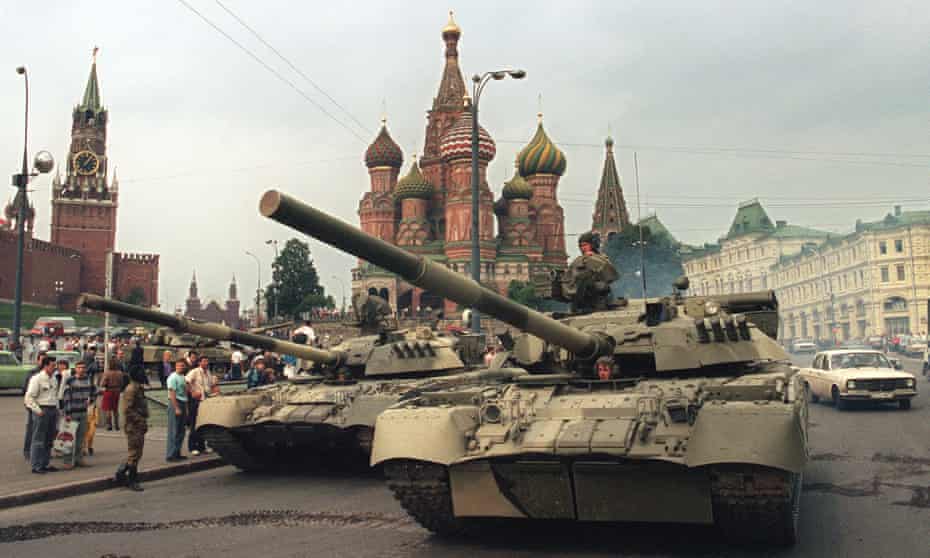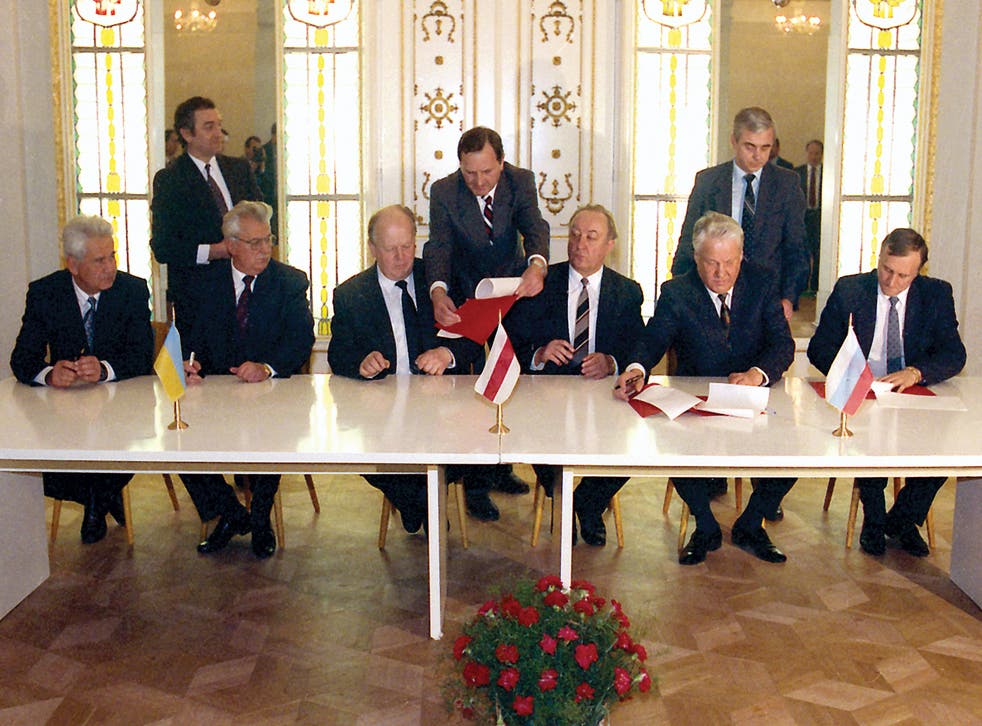The Beginning of the End of the Soviet Union
"A great empire, a nuclear superpower, split into independent countries that could co-operate with each other as closely as they wanted, and not a single drop of blood was shed. It wasn't a tragedy at all. We decided to shut the prison of nations. There was nothing to feel contrition for.""All versions of the union treaty boiled down to the restoration of the old ways or to Gorbachev's proposal of a new structure where he still would be the boss.""Kravchuk [Ukraine's Leonid Kravchuk] was focused on Ukraine's independence. He was proud that Ukraine declared its independence in a referendum and he was elected president on December 1, 1991.""Gorbachev told me in a mentor tone: 'Do you know what the international community would say?' And I responded that I do know. By that time the conversation with [U.S. President] Bush already started and I was hearing it. I said that Yeltsin was telling Bush about it and he [Bush] was reacting in a positive way."Stanislav Shushkevich, 86, Republic of Byelorussia (Belarus)"What they so hastily and stealthily did in Belavezha was like a plot to kill an injured but still living person by dismembering it.""The striving for power and personal interests prevailed over any legal arguments or doubts."Mikhail Gorbachev, 90, former USSR president"The Ukrainian independence referendum and the subsequent decision by the Ukrainian Supreme Soviet to disavow the 1922 treaty on creation of the USSR put a political and legal completion to the process of disintegration.""Yeltsin and Shushkevich first tried to persuade Kravchuk to maintain some form of union, but after the referendum, he wouldn't even like to hear that word."Sergei Shakhrai, top Yeltsin aide
 |
| Soviet tanks near the Kremlin in August 1991 after an attempted coup against Mikhail Gorbachev. The deal signalling the USSR’s demise was signed months later. Photograph: Dima Tanin/AFP |
The beginning of the end was heralded unintentionally by former general secretary Mikhail Gorbachev when he introduced the Soviet Union reformation concepts of glasnost and perestroika, the political movement within the Communist Party of the Soviet Union (CPSU) during
the 1980s, whose revelation became a worldwide sensation, that the USSR was opening up as Mr. Gorbachev tried to ease tensions between the Soviets and the West. He was a passionate reformer, one critical of the excesses of Stalin, like Nikita Khrushchev before him.
With the first crack of solidarity within the union, three Slavic republic leaders on December 8, 1991 met at a hunting lodge, a dacha in Viskuli, Belavezha forest to declare "the USSR ceases to exist as a subject of international law and as a geopolitical reality". Boris Yeltsin of Russia, Leonid Kravchuk of Ukraine and Stanislav Shushkevich head of the republic of Byelorussia took pride in co-signing the agreement, producing a "diplomatic masterpiece" of dissolution.
Eight other Soviet republics swelled the alliance two weeks later, thus terminating the authority of Soviet President Mikhail Gorbachev. The former Soviet republics revolving like satellites around the sun of Moscow, was no more. In his memoirs, the former president was bitter about the 1991 agreement destroying his own efforts to save the USSR from collapse with a new "union treaty" among the republics.
The rebuttal from Shushkevich pointed out that he and the other leaders felt Gorbachev's plans to resurrect the union was pointless. Latvia, Lithuania and Estonia had already seceded and the backdrop of the failed August coup against Gorbachev had seen his authority eroded, an encouragement to other republics to seek their own independence.
The three schemers, Shushkevich, Yeltsin and Kravchuk were accompanied by a few senior aides when they arrived at the Viskuli lodge. The atmosphere was later described as tense with the realization that the stakes were high including the risk they were taking of arrest on charges of treason should Gorbachev be so inclined. Eduard Shirkovsky, head of the KGB also at the hunting lodge had assured Shushkevich no threat to their safety existed.
Gorbachev had decided against moving against the plot fearing bloodshed in a volatile situation at a time the loyalties of the Soviet army and law enforcement were split. "If I decided to rely on some armed structure, it would have inevitably resulted in an acute political conflict fraught with bloodshed", he later wrote, blaming Yeltsin for spearheading the Soviet collapse, ambitious to take over the Kremlin.
Ukraine had declared its sovereignty after the August coup that had weakened Gorbachev's authority. The previous week Kravchuk had been elected Ukraine's president in a vote that gave full support to its independence from Moscow. At the hunting lodge Kravchuk was forcefully determined, rejecting a revamped version of the Soviet Union.
Describing the collapse of the Soviet Union as "the greatest geopolitical catastrophe of the 20th century", Vladimir Putin continues to to state his conviction that Ukraine unfairly inherited historic areas of Russian heritage with the demise of the USSR. Russia's response ultimately was to annex Crimea and back ethnic Russian Ukrainian rebels in eastern Ukraine, leading inevitably to the current Russian buildup of troops along the border with Ukraine.
 |
Russia Soviet Collapse Anniversary (Yuri Ivanov) |
"Modern Ukraine is entirely the product of the Soviet era.""We know and remember well that it was shaped -- for a significant part -- on the lands of historical Russia.""It's crystal clear that Russia was effectively robbed."Russian President Vladimir Putin
Labels: Dissolution, Gorbachev, Putin, Russia, Ukraine, USSR
0 Comments:
Post a Comment
<< Home